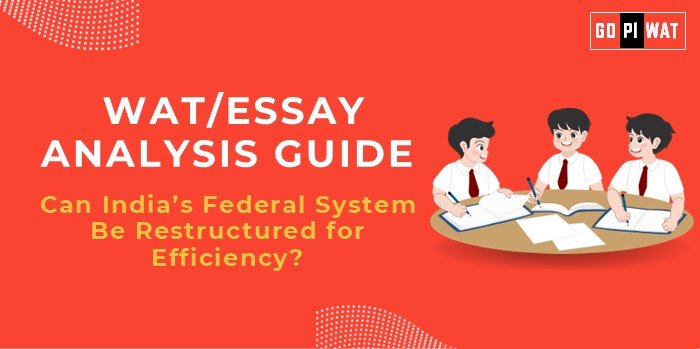🖋️ WAT/Essay Analysis Guide: Can India’s Federal System Be Restructured for Efficiency?
🌟 Understanding the Topic’s Importance
India’s federal system serves as a backbone for governance, reflecting its unity in diversity. With a growing economy and complex socio-political challenges, restructuring the federal system for efficiency can improve policy delivery, fiscal management, and conflict resolution. Such reforms are critical for addressing inter-state disparities, improving resource allocation, and meeting global benchmarks in governance.
📝 Effective Planning and Writing
- Time Allocation:
- ⏳ Planning: 5 minutes
- ✍️ Writing: 20 minutes
- 🔍 Reviewing: 5 minutes
- Preparation Tips:
- 📊 Gather recent examples, such as the impact of GST, cooperative federalism through NITI Aayog, and One Nation One Ration Card.
- 🌍 Compare India’s federal structure with systems in countries like Germany and Canada, which have established models of fiscal and administrative devolution.
🎯 Introduction Techniques for Essays
- Contrast Approach:
“India’s federal system has historically ensured unity in diversity, yet inefficiencies in fiscal devolution and administrative overlaps hinder its potential to meet 21st-century governance demands.”
- Timeline Approach:
“From the linguistic reorganization of states in 1956 to the landmark GST implementation in 2017, India’s federal framework has undergone significant changes. However, evolving economic and social complexities now necessitate further recalibration.”
🔍 Structuring the Essay Body
- Achievements:
- ✅ GST introduced cooperative federalism, unifying the indirect tax structure.
- 🤝 NITI Aayog replaced the Planning Commission, fostering greater collaboration between the Centre and states.
- 📈 Success stories such as the One Nation One Ration Card highlight improved coordination and efficiency in governance.
- Challenges with Comparative Analysis:
- 💰 Fiscal Centralization: States depend heavily on the Centre for revenues, receiving 42% of fiscal transfers (15th Finance Commission).
- ⚖️ Administrative Overlap: Duplication of duties leads to inefficiencies in project execution.
- 🌍 Global Context: Canada exemplifies efficient revenue-sharing, while Germany’s devolved powers to regional governments improve localized governance.
- Future Outlook:
- 📊 Targeted reforms in fiscal devolution can empower states to plan and execute policies effectively.
- 💻 Digital tools, like real-time governance dashboards, can streamline Centre-state interactions.
- ⚖️ Strengthening arbitration mechanisms for inter-state disputes will foster smoother coordination.
💡 Concluding Effectively
- Balanced Perspective:
“Restructuring India’s federal system to balance efficiency with inclusivity can ensure robust governance, enabling states to address their unique needs while contributing to national development.”
- Global Comparison:
“India’s federal system can benefit from global benchmarks such as Canada’s equitable fiscal policies and Germany’s administrative devolution. Phased, context-sensitive reforms will be key to achieving this.”
📊 Analyzing Successes and Shortcomings
- Key Achievements:
- ✔️ GST and NITI Aayog as milestones of cooperative federalism.
- 💡 Innovations in digital governance through schemes like PMGDISHA and DBT.
- Ongoing Challenges:
- 💸 Persistent fiscal dependency of states.
- ⚖️ Inefficient arbitration in inter-state disputes.
- Global Context:
- 🇨🇦 Canada’s fiscal federalism allows for equitable revenue-sharing and autonomy.
- 🇩🇪 Germany’s devolved governance ensures efficiency and responsiveness.
🚀 Recommendations for Sustainable Progress
- 💰 Introduce fiscal reforms to enhance states’ revenue independence.
- 💻 Develop a robust digital governance framework for better coordination.
- ⚖️ Strengthen mechanisms for resolving inter-state disputes and promoting collaboration.
📚 Sample Short Essays
- Balanced Perspective:
“India’s federal system requires reforms that balance efficiency with diversity. By leveraging digital tools and addressing fiscal centralization, India can modernize its governance framework while respecting its unique socio-cultural fabric.”
- Solution-Oriented:
“Fiscal devolution and the integration of technology are crucial for restructuring India’s federal system. Targeted reforms will empower states, streamline governance, and ensure equitable resource distribution.”
- Global Comparison:
“India can draw lessons from Canada’s equitable fiscal policies and Germany’s decentralized governance model to reform its federal structure. Implementing these globally inspired yet locally tailored reforms will ensure sustainable progress.”


